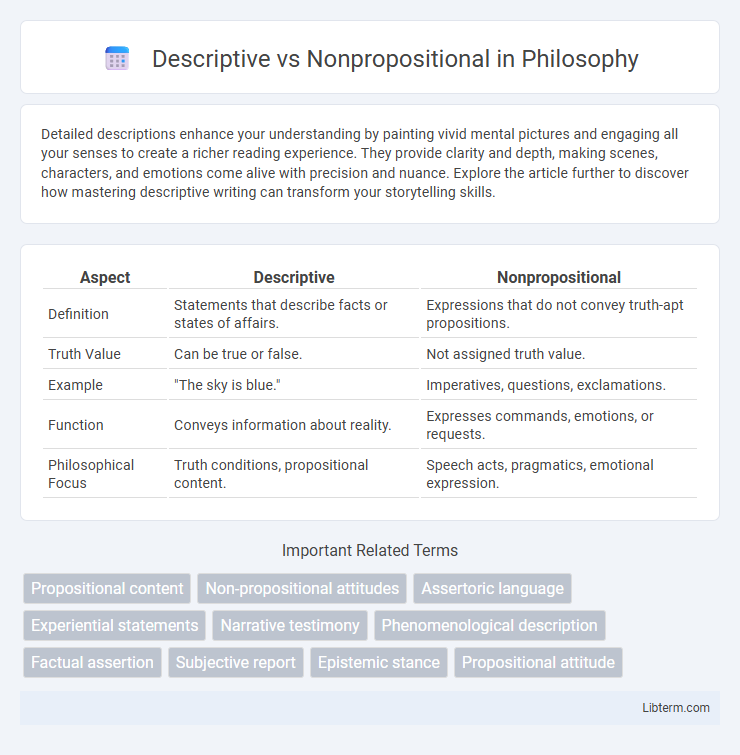Detailed descriptions enhance your understanding by painting vivid mental pictures and engaging all your senses to create a richer reading experience. They provide clarity and depth, making scenes, characters, and emotions come alive with precision and nuance. Explore the article further to discover how mastering descriptive writing can transform your storytelling skills.
Table of Comparison
| Aspect | Descriptive | Nonpropositional |
|---|---|---|
| Definition | Statements that describe facts or states of affairs. | Expressions that do not convey truth-apt propositions. |
| Truth Value | Can be true or false. | Not assigned truth value. |
| Example | "The sky is blue." | Imperatives, questions, exclamations. |
| Function | Conveys information about reality. | Expresses commands, emotions, or requests. |
| Philosophical Focus | Truth conditions, propositional content. | Speech acts, pragmatics, emotional expression. |
Understanding Descriptive Knowledge
Descriptive knowledge involves understanding facts, concepts, and relationships that can be explicitly communicated and verbalized, distinguishing it from nonpropositional knowledge, which encompasses skills and experiences often difficult to articulate. This type of knowledge is foundational in fields like science and education where clear definitions and explanations are essential for transmitting information. Mastery of descriptive knowledge enables precise comprehension and effective communication of complex ideas.
What Is Nonpropositional Knowledge?
Nonpropositional knowledge, often referred to as a type of tacit or experiential knowledge, involves understanding gained through direct experience or practical engagement rather than through explicit statements or propositions. It contrasts with descriptive knowledge, which is based on factual, declarative information that can be expressed clearly in language. This form of knowledge encompasses skills, know-how, and intuition that guide actions without necessarily being codified in verbal or written form.
Key Differences Between Descriptive and Nonpropositional Knowledge
Descriptive knowledge involves explicit facts and information that can be clearly articulated and verified, such as scientific data or historical events. Nonpropositional knowledge, often called tacit knowledge, encompasses skills, experiences, and intuitions that are difficult to express verbally, like riding a bicycle or recognizing faces. The key difference lies in the articulability and verifiability of the knowledge: descriptive knowledge is declarative and objective, whereas nonpropositional knowledge is procedural and subjective, relying on personal experience and practice.
Examples of Descriptive Knowledge
Descriptive knowledge includes facts and information that can be explicitly stated, such as the capital of France is Paris or water boils at 100 degrees Celsius at sea level. Examples of descriptive knowledge also encompass historical dates, scientific laws, and definitions, like Albert Einstein developed the theory of relativity or a triangle has three sides. This type of knowledge contrasts with nonpropositional knowledge, which involves skills or know-how, such as riding a bike or playing a musical instrument.
Examples of Nonpropositional Knowledge
Nonpropositional knowledge encompasses skills and know-how that cannot be easily expressed through declarative sentences, such as riding a bicycle, recognizing faces, or playing a musical instrument. For instance, knowing how to swim involves embodied practice and sensory experience rather than factual statements. These forms of knowledge contrast descriptive or propositional knowledge, which involves explicit facts and truths like "Paris is the capital of France.
The Role of Experiences in Nonpropositional Knowledge
Experiences play a crucial role in nonpropositional knowledge by providing direct, embodied understanding that cannot be fully captured through descriptive facts or semantic propositions. This type of knowledge encompasses skills, emotions, and perceptual awareness gained through lived events, emphasizing tacit insights rather than explicit statements. Nonpropositional knowledge from experiences enriches personal understanding and shapes intuitive decision-making, highlighting the inseparability of cognition and experience.
Importance of Descriptive Knowledge in Learning
Descriptive knowledge, which involves understanding facts, concepts, and relationships, is crucial for effective learning as it provides a foundational framework for processing new information and solving problems. Unlike nonpropositional knowledge, which includes tacit skills and intuitions, descriptive knowledge enables learners to explicitly articulate and analyze content, facilitating deeper comprehension and academic success. Emphasizing descriptive knowledge enhances cognitive organization and supports transfer of learning across different domains.
Limitations of Descriptive and Nonpropositional Knowledge
Descriptive knowledge is limited by its reliance on explicit, propositional statements that may fail to capture the full complexity of experiences or tacit understanding. Nonpropositional knowledge, such as skills or intuitions, often lacks clear articulation and resists formal codification, making it difficult to communicate or analyze systematically. Both types face challenges in accurately conveying practical or embodied knowledge, restricting their effectiveness in certain learning and decision-making contexts.
Practical Applications in Real Life
Descriptive language provides detailed, sensory-rich information crucial for applications like medical imaging reports, legal testimonies, and product manuals where precise, clear descriptions enhance understanding and decision-making. Nonpropositional communication, encompassing gestures, art, and music, plays a vital role in therapy, nonverbal communication, and cultural expression, facilitating emotional connection and conveying meaning beyond literal words. Practical real-life use leverages descriptive language for knowledge transfer and nonpropositional forms to enrich interpersonal interactions and emotional resonance.
Summary: Choosing Between Descriptive and Nonpropositional Approaches
Descriptive approaches prioritize clear, detailed explanations of concepts and phenomena, enhancing comprehension through structured and observable information. Nonpropositional methods focus on abstract, experiential, or intuitive knowledge that resists simple factual summarization but captures deeper, often subjective understanding. Selecting between these approaches depends on the goal: descriptive techniques suit precise communication and analysis, while nonpropositional strategies better address complex, nuanced insights.
Descriptive Infographic

 libterm.com
libterm.com